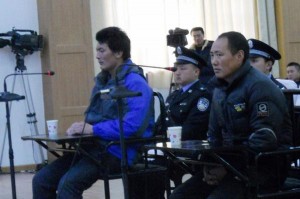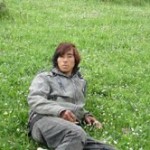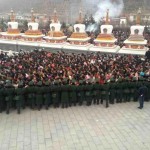The increased police response to protests drastically erodes human rights in Tibet.
This month has seen a dramatic surge in police action against Tibetans with almost 90 individuals detained in Eastern Tibet, in what the Tibetan Center for Human Rights and Democracy describes as a “relentless crackdown on self-immolation protests including arbitrary arrests, detention, intimidation, monetary inducements, and long prison terms.” Some Tibetans were arrested and sentenced to years in prison, one was sentenced to death, and an unknown number were beaten and detained without the release of their whereabouts.
Connections to Self-immolators Criminalised
February opened with the sentencing of six Tibetans in Sangchu, who were charged on January 31, following the demonisation of aiding self-immolatiors as “murder” since October 2012. Pema Dhondup, Kalsang Gyatso, Lhamo Dhondup, and Pema Tso were charged with “intentional homicide” for trying to keep the body of a self-immolator from Chinese officials. All were given anywhere from 7 to 12 years in jail. Additionally, Dugkar Gyal and Yangmo Kyi were sentenced to 3 and 4 years, respectively, for “picking quarrels and provoking troubles.” All of the six were charged in connection to Dorjee Rinchen, 57, who set himself alight in front of the Peoples Liberation Army Recuitment Center in Sangchu in October last year.

Lobsang Kunchok (right) and his nephew Lobsang Tsering stand trial over inciting self-immolation, on 26 January 2013.
Also on the 31 January, in Ngaba, the Xiahe County People’s Court sentenced Lobsang Kunchok, 40, to death with a two year reprieve and his nephew, Lobsang Tsering, 31,was sentenced alongside Kunchok to 10 years in prison. Both were charged with “intentional homicide” of eight Tibetans in Ngaba, although five of the self-immolations never occurred.
Targeting Family Members
On February 4, China’s forces in Rebkong reacted to the self-immolation of Dorjee Lhundop, 25, who passed away in his protest on Novermber 4th, 2012. Authorities summoned Yarphel and Drayang, monks from Yershong Monastery. After interrogating them and releasing Drayang, they detained Yarphel, 42, who was Lhundop’s uncle.Yarphel had allegedly carried Dorjee Lhundop’s photo, and Drayang carried His Holiness the Dalai Lama’s, as a throng of Tibetans carried Lhundop’s ashes to his village. Although H.H. the Dalai Lama’s photograph has been illegal in TAR and its surrounding areas for years, it was Lhundop’s uncle who was held, for the photo of his nephew.
Unprecedented Number of Tibetans Detained
The Tibetan community reeled with shock when 70 Tibetans were detained on February 8th alone. According to Xinhua (the largest media center in China), they were “suspects” in connection with a “string of self-immolations” in Mahlo since November last.
Many were targeted after mourning the self-immolators, such as Phagpa, 27, from Rebkong, who attended six self-immolators’ funerals and offered charity to their family members.
On February 11, Phagpa was sentenced to 13 years, charged for “intentional homicide and inciting split of the state.” He was also found guilty of “indoctrinating” and “convincing” Dolma Kyab, 25, a monk from Phagpa’s neighboring monastery, into considering self-immolation.
Also on February 11, Xinhua reported that an elderly Tibetan from Malho was found guilty of “spreading opinions related to ‘Tibetan Independence’” when he consoled family members of self-immolators. Gyadehor, a 60-yr-old herdsman, was sentenced to 4 years in prison.
Protestors Slandered and ‘Seriously Punished’
Xinhua stated that steps are being taken to “seriously punish those who incite innocent people to commit self-immolation.” Police brutality erupted in Tsawa Dzogang, Eastern Tibet: Phayul reported on 22 February that six young Tibetans were apprehended and “brutally beaten” for their protest on 10 February. The day after the protestors carried a banner reading “Indepdence for Tibet,” a Chinese contingent arrived and beat them severely, reportedly causing broken ribs and a broken arm. The identities, whereabouts, and current condition of these individuals are still unknown. Following these arrests, Ngawang Topden, 20, was arrested in Lhasa on February 22nd and sentenced as a “reactionary” to 2 years in a Toelung prison. Topden, a student of thangka painting in Eastern Tibet, was carrying a mobile phone with photos of self-immolators, Tibetan flags, and images of Chinese police brutality.
Complete Police Control
Widespread reports of police brutality continue to seep across the border into exiled Tibetan communities. Human Rights Watch confirms the “endemic use of torture, cruel, inhuman or degrading treatment, and coercion of Tibetans in detention.” Though the PRC has many laws in effect that would appear to provide human rights and judicial review to Tibetans, the reality is a disregard for Chinese law.
According to the Executive Summary on Tibet by the US Department of State, even the laws allowing police to legally detain persons for up to 37 days without formally arresting or charging them are not being followed: “Police must notify the relatives or employer of a detained person within 24 hours of the detention. Following the 37-day period, police must either formally arrest or release the detainee. In practice, police frequently violated these requirements.” The justice system is run by “all ethnic Han,” and while prisoners have the right to request a government-appointed attorney, “in practice many defendants, particularly political defendants, did not have access to legal representation.”
Tienanmen Square
As well as politically criticizing the recent self-immolations by Tibetans in China, the Chinese authorities have introduced new measures to reduce the publicity of the protests. This has included installing fire extinguishers in Tienanmen Square, and in the same vein, organising fire fighting teams in several monasteries around Tibet.







 Print
Print Email
Email